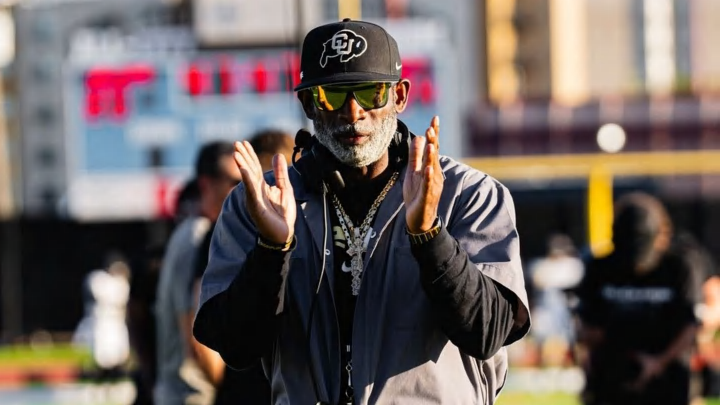Op-Ed: Could Deion Sanders be missing a "senior advisor" in his coaching journey?

If Bobby Bowden were still around, perhaps he could guide Deion Sanders with a little more than just football advice—maybe he'd offer him a lesson in humility, warmth, and class. At least Orlando Sentinel writer Mike Bianchi wonders the "what ifs" in his latest piece.
Bowden was one of the most "beloved figures" in college football. Sanders, on the other hand, is starting to prove that despite his "Prime Time" nickname, he might not be ready for the big stage as a college football coach, at least when it comes to some of the finer points of leadership and public relations.
Deion Sanders undoubtedly had a legendary playing career, excelling at both Florida State and in the NFL. However, his transition into coaching, particularly as the head coach at Colorado, has been less about his ability to win games—after all, he inherited a 1-11 team and went 4-8 in his first season—but more about his approach off the field. Bowden’s success was rooted in more than just his football knowledge. The legend's ability to connect with people personally. Sanders, in contrast, has shown a propensity for being dismissive, especially in his interactions with the media.
Former NFL MVP Cam Newton defends Deion Sanders: "CBS, you f'ed up"
"I’m mostly talking about his ability to recruit and relate to players, deal with the media and fans, charm the socks off of recruits and their parents and all of the other intangibles his college coach, Bobby Bowden, was so good at," Bianchi wrote. "I’ve often said that Bobby was the greatest ambassador in college football history — a kind, gracious and funny man who made everybody around him feel important. Deion is proving to be the exact opposite as a conceited, condescending, paranoid man who makes everybody around him feel like dirt."
Former Colorado players detail alleged violent incidents in damaging report
A recent press conference highlighted this divide. Sanders, instead of engaging with the media, spent most of his time arguing over semantics and making snide remarks. When a reporter used the word "bolstered" to describe Colorado’s offensive line, Sanders interrupted to say, "What does ‘bolstered’ mean? Let’s say we improved our offensive line instead." This nitpicking and arrogance have become a pattern for Sanders, leading to a perception that he is more concerned with appearing superior than building positive relationships. Not to mention shutting down reporters from CBS Colorado and Denver Post after trying to ask their respective questions.
Such behavior stands in stark contrast to Bowden’s philosophy. Bowden believed in treating everyone with kindness and respect, regardless of how they treated him. This approach not only earned him respect but also helped him in his career. Sanders, however, seems to be taking the opposite route, alienating those around him.
"As I wrote on the day Bobby died, one of my proudest moments as a journalist came in his final press conference after his final game — a Gator Bowl victory against West Virginia," Bianchi added. "Bobby was thanking the media for all of their coverage of him and his program over the years, including columnists like me who sometimes criticized him when he lost a big game or when one of his players got arrested or when he hung on too long as FSU’s head coach.
"Bobby picked me out of a standing-room-only crowd and deadpanned: “Bianchi, even from you I’ve had fair treatment. … Bianchi wrote some of the toughest ones about me and I guarantee he’s written some of the best ones about me.”
As Sanders navigates his coaching career, he could benefit from a lesson Bowden often embodied: humility and respect go a long way. Being a great coach isn’t just about the title; it’s about how you treat people. Unfortunately for Sanders, this might be a lesson learned too late.
